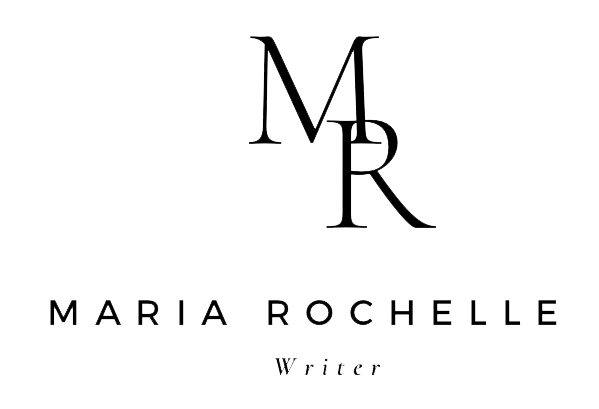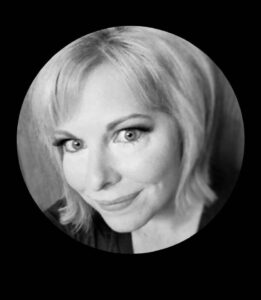My latest interview is with Ava Black, author of The Bug Jar. It’s a psychological thriller and can be purchased on Amazon. She’s been writing for ten years which she says there’s a lot to love and hate about writing. Find out why she says that by and which authors inspired her to write.
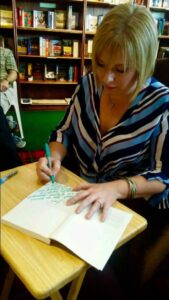 |
| Ava autographing her book. |
What do you love about your life right now?
Right now I love that readers have changed writing’s landscape by becoming more willing to buy, read, and review independently/self-published books. This changed my life. In the past ten years, more independent presses have opened and succeeded, while there are more best-selling authors are abandoning larger systems to self-publish. This move towards indie presses and self-publishing helps writers maintain more creative control, story rights, and profits. Overall, traditional publishing still dominates the industry, but I love that this shift allows marginalized voices to be heard and non-formulaic stories to be told. It’s great to see that readers support this change. Because they have, I’ve been able to tell a non-traditional tale about a mentally ill mistress, who readers don’t really like, but for some reason love. Thank you, readers! I love that!
How long have you been writing and what do you love about it?
For ten long, tedious, painful years, I’ve been writing. Joking! But not really. There is a lot to love and a lot to hate about writing. Most writers say they love getting lost in the story and spending time with their characters. It’s a world you can control (sometimes). It’s an escape. It can also be an emotional purge and a way to voice thoughts and ideas that may not be appropriate to speak. I love the release writing brings. But I don’t like how obsessive I become when writing. Many of my writer friends experience
the same challenge. Often, when the chapter is going well, and the story starts to flow, we’d rather keep writing than eat, sleep, work, or take the kids to practice. There’s something about unraveling a scene in a rhythmic way that makes writing addictive. That addictive quality is great for the book and self-fulfillment, but agonizing when literary agents reject the novel. It makes you fear that it will never be read. That you’re a failure, that you’re less-than, as a writer. Rejection is a whole other topic that I could write about for days.
Was there a particular book or author that inspired you to write?
Chelsea Cain and Jennifer Hillier are incredible authors. The way they weave plot threads together forces readers to fully engage in the narrative and never skip pages. I admire these writers so much that I sent them fan mail, and to my surprise, they responded. Their responses were incredibly warm and generous. When I told them I was a writer who was struggling to get published, they immediately became candid about their struggles to be published or maintain their sales. To have authors, who perform at their levels, talk so openly about struggling, made me realize that we’re all in the same boat. It also made me
realize that I was like them because what drives us is our love of writing. Knowing that I felt the same way about writing as top-tier writers did, made me think that I had what it took to be one.
Tell me about your book, The Bug Jar, and what were the challenges and joys of writing it?
The Bug Jar is a psychological thriller which blends my friend’s personal experience with bipolar disorder and a fictional murder. In the novel, the heroine, the bipolar mistress of a Chicago mayoral candidate, is accused of killing his child. She remembers that she was at his home on the night of the murder, but because of a misdiagnosis, and the effects of inappropriately prescribed medications, can’t remember what she was doing there or why she went. She investigates and finds evidence which suggests the murder was a cover-up manufactured by an unlikely suspect to evade a political scandal, but also uncovers evidence which indicates her absolute guilt. She struggles with herself, and the detectives tailing her, to reveal the truth about her involvement until she is institutionalized and meets….oops! No spoilers!
One of the biggest challenges I faced in penning this novel was maintaining the anonymity and integrity of my friend. She is an educated professional, working in a high-stress industry, and does not disclose her illness. I didn’t want to portray mental illness as something wild and scary. It is a real challenge faced by millions of Americans who risk their jobs, incomes, and families if they reveal too much to the wrong person. That being said, I did want to showcase the silent screams so many release. I wanted them to be accurate and truthful. My friend was incredible in helping me find that voice, but I struggled to hear it because sometimes is ugly, painful, and disturbing in ways that nobody talks about. Writing pieces of her truth, while preserving her dignity, and the dignity of anyone with a mental disorder is incredibly difficult because so much shame and humiliation surround it.
How long did it take for you to complete the book?
Generally, it takes nine to twelve months to write a manuscript which is fast considering I work full time and raise two sons. But I become pretty obsessed with whatever I’m writing, which helps it along. The querying process, however, is a bit different. When a writer finishes a manuscript, they pen query letters to literary agents asking the agent to represent the manuscript. If an agent agrees to represent the work, they begin the task of pitching and selling the manuscript to publishers (Big 5 publishers don’t accept manuscripts which are represented by literary agents). The process of securing a literary agent can take months or years. Currently, there are four books on my backlist that are unpublished because agents aren’t interested. Most of the feedback agents gave included something along the lines of “… a page-turner, but not for a mass-market audience.” “… read it in three days, but it is too fringe for a commercial audience.” “Not commercial enough.” After about a year or one hundred rejection letters, I usually give up on querying a novel. But with The Bug Jar, I’d conducted so many interviews with so many subject-matter experts, spent so much time researching, and so much time driving around the setting (Chicago)
collecting sensory details, that I couldn’t let it go. I’d just put too much work into it. After the hundredth rejection letter, instead of tucking it under the bed and forgetting about it, I decided to self-publish.
Where can your book be purchased and what formats?
The Bug Jar can be purchased through Amazon or Barnes & Noble in paperback, Kindle, and Nook formats. It is also available at independent booksellers throughout the Midwest.
Are you working on another book?
I’m always working on another book! My next novel is about a terminally ill, female villain who blackmails a friend into killing her before the illness does. If the friend fails, the villain will reveal a secret that destroys both of their lives. The inspiration for this book was my terminally ill cousin who died of ALS. I ran the plot idea by her and she loved it.
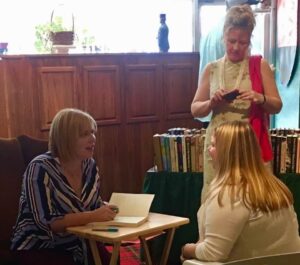 |
| Ava with Micki Colgan. It was her first sale! |
Stephen King is quoted as saying, “If you don’t have time to read, you don’t have the time (or the tools) to write. Simple as that.” Do you agree and why?
Agree! A writer can learn so much from reading. Grammar, formatting, punctuation, and other skills can be acquired by studying well-written works. It’s great to have unique ideas for plot and characters, but unless the story is told in a way that captivates readers, not just the person writing it, all is lost. Also, I just have to say here, when someone says, “I don’t have time to write,” I cringe. I think about my writer friends, most of whom work full-time and have kids, who write every day. They write for twenty minutes at lunch. They write for thirty minutes before bed. They get up an hour early to write. There is always time to write. The writer just has to decide whether or not writing is important enough to them to do it.
What’s been on your reading list for the summer?
This summer I’ve read My Darkest Prayer by S.A. Cosby, a talented new voice in crime fiction. Shawn Cosby (S.A. Cosby) struggled for years to have his work read, but was recently nominated for an Anthony award and secured representation by a well-known New York literary agent. I’m so excited for him! He is truly talented. I’m very much looking forward to his upcoming releases. Likewise, anything by the fabulous Renee James is on my reading list. Renee is a tremendously talented author who writes the Bobbi Logan series, the first of which was Transition to Murder which profiles a Chicago hairdresser who finds herself investigating the brutal murder of her client, a transgender woman.
“I can shake off everything as I write; my sorrows disappear, my courage is reborn.” Quote by Anne Frank. Does writing do that for you?
Never! Writing actually brings a lot of these feelings to the surface, which is good because you can use them to develop richer characters with emotional depth. Also, my courage is never reborn when writing. Writing makes me question my sentence structure, grammar, concept, theme, character arcs and generally confuses the hell out of me. But if you feel moved or intrigued when you reread the pages, you know you’ve got something good, unless you show it to the world and readers hate it. Writing isn’t great
for confidence unless you feel secure in what you’re written…and I don’t know that any writer ever does.
Any advice that you can offer to writers who desire to be an author but has allowed fear to stop them?
Fear inhibits your writing’s greatness. When fear causes you to hesitate, you begin to self-edit and whitewash your narrative/dialog because you’re scared people will harshly judge it. That hesitation creates a bland, voiceless character that people will find unreadable. If you feel like you have something
that needs to be said or a story that needs to be told, tell it as if you’re talking to your best friend. Uncensored. Unedited. Write it as if nobody will ever read it. Bring that honesty into the novel and let your characters develop without judgment. Let them do what they’d do naturally. Let them lead the way. Once you’re a few chapters into the manuscript, your characters will start taking over and their authentic voices will emerge. You’ll realize that maybe you aren’t in control of the monster you created, but that’s the fun part of it. Don’t let your writing be about you, let it be about something that is greater than you. Once you’ve actually finished the novel, go back into it and edit it in a way that makes it appealing to readers, and the market, if your goal is sales. But during a first draft, the most important thing you can do is realize that you need to get it done. So do it. Don’t judge yourself. Don’t be harsh on yourself. Just write. Eventually, you’ll go back and edit, many times, which will bring your work to a good place that you won’t fear. Save the fear for your release day! Now THAT is scary!
Is there any advice you wish you were given before you started writing?
Years ago, I befriended an up-and-coming Hollywood scriptwriter. We’d chat off-and-on about writing and our struggles to have our works recognized. Over the years, he went on to secure incredible representation and now writes major motion pictures with A-list actors. A while ago, I was approached to write a script for a short, non-Hollywood, indie film, and consulted my Hollywood friend regarding the contract. I told him I was excited about this opportunity because it was a phenomenal validation of my skills. He said that was bullshit. He went on to explain that the best writing he’d ever done was when
he helped a terminally-ill woman write her memoir about living with cancer. He stated that the discussions he had with her, and the product they turned out, which remains unpublished, was the best work he had ever done. That really gave me pause. I couldn’t believe a piece of writing that powerful was never published, but he said that publication often has nothing to do with talent, and more to do with money. Yes, your novel may be the most poignant, impactful piece of literature ever penned, or the most fun and entertaining, but if the system believes it won’t make them enough money, it goes in the recycle bin. Know that you will get rejected. A lot. And it has nothing to do with your skill or dedication. To date, I have over four hundred rejection letters on four novels, and am still unrepresented, but The Bug Jar (a self-published book), has readers on four continents, thirty-four Amazon reviews, forty Net Galley reviews, praise from multiple award-winning authors, award-winning journalists, award-winning bloggers,
appeared on multiple blogs in the US and UK, was named a Top Ten Book Of The Year on multiple blogs, and toured about seven bookstores in three states. So writers, know that the worth in your writing has nothing to do with publication contracts or agent approval, but comes from your own sense of accomplishment and the reaction of the readers. Don’t be afraid to say what you want to say or tell the story you want to tell. Tell it and know that you succeeded because you wrote.
Tell me three fun facts about you.
Fun facts? Um….let’s see. I don’t know that these are fun, but they’re interesting. Maybe.
I can milk a cow.
I can change a tire.
I talk my way out of at least three speeding tickets a year (delete that fact if any of your readers are state troopers!).
I share motivational quotes with my readers, do you have a quote or saying that has inspired or encouraged you during a difficult time or to keep you motivated to go for your dreams?
Honestly, I hate motivational quotes. I think they’re useless. I think the best motivation is listening to how you feel. Take stock of what your internal voice is telling you. Listen to yourself. Not others. When I first started writing, I didn’t tell anyone for a year. Eventually, I had to because I needed critique partners, beta readers, and editors, but getting very quiet and listening to that small voice inside you will always
lead you down the right path. Honor yourself.
Describe yourself in one word.
Writer.
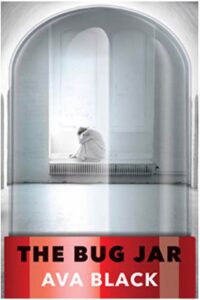 |
| Click here to check out her book |
Follow Ava on social media!
